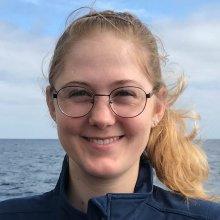
Taylor Ely
Tell us about your work/research. What kinds of things do you do?
I work mainly with genetics as a tool to investigate questions of biodiversity and marine conservation. Currently, I work with environmental DNA (eDNA). eDNA is used to accurately determine the composition of marine organisms in an area such as an MPA to assess the sanctuary’s effectiveness. However marine eDNA techniques are new. My senior honor’s thesis is on investigating the temporal variation of eDNA. Temporal variation, the amount of time that can be surveyed with eDNA samples, is determined by understanding the degradation rate of eDNA. This is important for making accurate conclusions about diversity and effective monitoring for management. For this project, I designed the experiment, did field collections, did laboratory work up until sequencing it, and am currently working on analyzing the data.
What sparked your initial interest in your career?
I grew up in a beach town in southern California. I spent most of my free time during my childhood (and even now) in the water. I got certified for scuba diving at age 11 and my love for the ocean grew so much stronger. The reason I choose to go into marine conservation resulted from a combination of an environmental science class I took in high school and all the stories I heard from older scuba divers about how there used to be so much more life at the dive spots. I always knew I wanted to go into a field within science. After learning about how much we are harming the ocean and that there is so much we don't fully understand I knew that I wanted a career within marine conservation.
Who influenced you or encouraged you the most?
My teachers in high school, especially my chemistry and physics teacher, are one of the main reasons why I love science as much as I do. They were very encouraging and made everything so interesting and hands-on. In college, the graduate students I have worked with always explained why we were using certain methods and why it was important. Both the PI of the lab and graduate students encouraged me to start a project of my own and helped me a lot throughout the process of it. I am very thankful to all of them and would not be where I am today without them.
What element of your work/study do you think is the most fascinating?
There are so many things that I do which I find fascinating. One thing that will always amaze me is from collected water samples you can extract DNA and identify the species that live in the surrounding area more accurately than by conducting a tradition visual survey. It is crazy that from something basic as water you can retrieve so much valuable information.
What other jobs led you to your current career?
While I was always interested in marine conservation, the opportunities I have had taught me that I really enjoy the research aspect of it. My first exposure to marine biology was as a public programs intern at the Santa Monica Pier Aquarium. I loved creating presentations, helping with events, and teaching kids about the ocean and why they should protect it. However, after I joined a research lab at UCLA as an undergraduate researcher I found that I much preferred investigating topics and ideas within marine conservation. This was reinforced during my time in Mo'orea and at the Smithsonian National Museum of Natural History where I again was working on research projects. It is fascinating to start from just an idea and work all the way to the end results that could have an impact on conservation efforts or management.
What are your degrees and certifications?
Bachelor of Science in Marine Biology-University of California, Los Angeles 2018, CPR and First Aid Certified, Scientific Diver since 2016, Open Water and Naturalist Diver since 2008
What are your hobbies?
I love snow-skiing and hiking around LA but prefer the woods. I also try to spend as much time in the water either bodysurfing, kayaking, scuba diving, or waterskiing.
What advice would you give someone who wants to have a career like yours?
If you want to go into a career in marine biology then I would really think about why you want to and what helps best to accomplish that goal. For me the reason why was to help marine conservation efforts to preserve what I love. Thinking in this way can help narrow your interests in a broad field like marine biology. I also recommend learning essential tools while in college or on your own that really help you so you aren't overwhelmed when people start talking about highly technical topics. Some of these would include coding in R and python, computer modeling, and statistics specific for ecology. Lastly, try to join research projects to get hands-on experiences that can help you learn what you do and don't like about marine research.
How did you get involved with the Nautilus Exploration Program?
I applied for the Ocean Science Intern through Ocean Exploration Trust. I found out about the internship while looking for opportunities related to marine science for my gap year.
Expeditions
Taylor participated in the following Ocean Exploration Trust expeditions:
